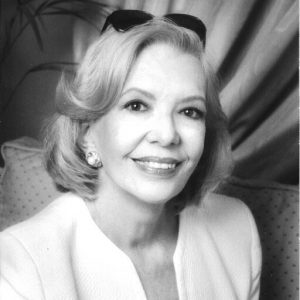
We were extremely sad to learn of the death of Una-Mary Parker, a brilliant interviewee of ours for the Balancing Beliefs project. Una-Mary’s life was fascinating, and we have included the link to one her obituaries below. As well as a highly successful career as a journalist and author, she was also famous as an etiquette expert. Although to many of us, this might at first sound a rather niche preoccupation: either to be written off as one of those charming British anachronisms, like horse-hair wigs for judges, or more negatively, to be condemned as a perpetuation of class privilege and social exclusion, the fundamental basis of what Una-Mary practised, as well as preached, was kindness.
There are certain houses, offices, cars and other personal spaces which ooze precision and correctness to such a degree that entering them is a daunting experience. However, despite being the private domain of an expert in good manners and protocol, Una-Mary’s residence was nothing like this. Tucked just around the corner from Harrods, Una-Mary kept an incredibly welcoming home, and even though arriving on a stranger’s doorstep to quiz them about their views on religion, belief and the British Constitution is not exactly the most natural of situations, our hostess had the gift of dispelling awkwardness. Noticing that one of her interrogators was obviously cold on a brisk (or more accurately, freezing) spring day, she hustled us over to the fire-place and made sure that we had hot drinks. Afterwards, for almost two hours, she chatted as though we were old friends, and it was a real privilege to listen to her insights, memories and observations on the changes which she had witnessed in British society over the decades.
The world in which Una-Mary grew up was dramatically different from the one we now inhabit, and there are many aspects of life in the early twentieth century which we would not want to experience first-hand. We are grateful for a whole range of legal rights, not to mention social freedoms, which our recent ancestors were denied and which we fortunately enjoy nowadays. Until half way through last century, women could not legally complain if their husbands raped them, casual racism was common, gay people faced prison for having sex, and being beaten with sticks or slippers was a routine part of many childhoods. Equally, the availability of antibiotics, mobile phones, central heating, the internet, as well as a myriad of other scientific developments have added to the comfort, convenience and even average span of our lives.
Nevertheless, this does not mean that all of the habits of our grandparents should be dismissed. In an era with unquestionable focus on the self, it is valuable to be reminded of the virtues of thinking about other people’s needs and feelings. The good of being considerate, thoughtful, and frankly sometimes doing things which we don’t want to do, but which are nevertheless good for those around us, is worth hanging on to. It is no accident that most religious, spiritual and ethical pathways commend caring for others. In a world which often loudly encourages to us grab the biggest slice of cake, we should treasure the voices which politely suggest an alternative path. Offering the plate to our friends in the first instance is not really about doing the correct thing so that we can look sophisticated, it is about taking an active interest in their happiness, instead of exclusively obsessing over our own. If we want to achieve an inclusive, cohesive society, reflecting on who our behaviour touches others is essential, and as a result, Una-Mary’s practice of encouraging kindness is one which we would do all well to embrace.
Related Articles
Obituary: Una-Mary Parker The Independent (29/4/19)
My Fair Lady Plays A Courtesy Call The Telegraph (29/3/08)


